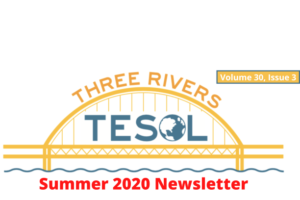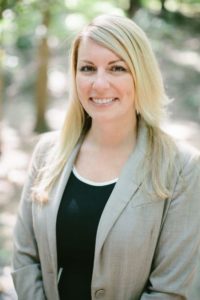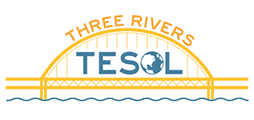 2020 TESOL Virtual Advocacy and Policy Summit
2020 TESOL Virtual Advocacy and Policy Summit
The 2020 TESOL Virtual Advocacy and Policy Summit, that took place between June 22 and 24, 2020, brought together a great number of TESOL professionals from all over the world. Although we attended the conference from the comfy corner of our couches, we fully experienced the global connections. Both days were packed, with seven to eight presentations going one right after another. David Cutler, TESOL Director of the Advocacy and Outreach, started each day with an overview of the day, and any pertinent information about the summit. We listened carefully, took notes, and synthesized them, not only to share our impressions but to provide you with a distilled version of the current issues, context, and most importantly to encourage you to join in the advocacy efforts.
Day 1: TESOL Virtual Advocacy and Policy Summit
by Megan Evangeliste
 The TESOL Advocacy and Policy Summit allowed me to have a voice. This year, I addressed Senators Bob Casey, Jr. and Patrick Toomey and Representative Mike Doyle about co-sponsoring The Reaching English Learners Act, passing the HEROES Act and The Supporting Providers of English Language Learning (SPELL) Act, and calling out TESOL’s legislative priorities.
The TESOL Advocacy and Policy Summit allowed me to have a voice. This year, I addressed Senators Bob Casey, Jr. and Patrick Toomey and Representative Mike Doyle about co-sponsoring The Reaching English Learners Act, passing the HEROES Act and The Supporting Providers of English Language Learning (SPELL) Act, and calling out TESOL’s legislative priorities.
The day included updates about the current status of advocacy initiatives supported by TESOL.
- Namely, David Cutler, TESOL Director of Advocacy & Outreach, shared the 2020 U.S. Federal Policy Update, which brought members up to speed on legislation currently in Congress.
- Roger Rosenthal Migrant from the Legal Action Program communicated the rights of immigrant students in ELs in public schools, and immigration issues that these students are facing; and finally,
- The session U.S. Policy: 2020 Census from Deborah Kennedy from the National Coalition for Literacy emphasized how ESOL professionals must be advocates for a full and fair census.
Day 1 provided necessary context about current immigration and advocacy issues that affect our K-12 and adult learners on a daily basis. Firstly, The Reaching English Learners Act addresses the shortage of funding to support institutions of higher education who are preparing the next generation of English Learners.
Institutions of higher education would be required to partner with local educational agencies to build or strengthen teaching programs that provide teacher candidates with skills related to:
- helping ELs in PK-12 achieve at high academic levels and attain English proficiency
- recognizing and addressing the social and emotional needs of ELs
- identifying and instructing ELs with disabilities, and promoting parental, family, and community engagement in EL educational programs.
As constituents and advocates for the nearly 5 million English learners in the nation’s public schools, it is essential that we write to ask our representatives to co-sponsor the Reaching English Learners Act (H.R. 1153).
Secondly, The HEROES Act was passed in May 2020 by the House of Representatives in response to the funding issues created by COVID 19 pandemic. The HEROES Act provides $100 billion in K-12, adult, and higher education funding to help make-up for these cuts. This $3 trillion spending bill includes $100 billion for K-12, adult, and higher education. Unfortunately, however, this bill has stalled in the Senate, and no additional relief funding for the nation’s schools has been appropriated. Many of the programs that receive supplemental funding will directly impact English learners and English language professionals.
Thirdly, The Supporting Providers of English Language Learning (SPELL) Act offers student loans relief by providing increased amounts of student loan forgiveness to English language teachers. Furthermore, this bill denotes English language teachers as highly valued educators by putting them on the same level as math, science, and special education teachers who are currently eligible for increased student debt forgiveness amounts.
In conclusion, TESOL has organized a useful resource for all teachers of linguistically and culturally diverse learners to advocate for their students. The TESOL Advocacy Action Center promotes clear action steps and lines of communication to discuss current practices and needed funding with state representatives. I encourage all teachers, especially our Three Rivers TESOL members, to visit the Action Center and write to their senators and representatives: https://www.tesol.org/advance-the-field/tesol-advocacy-action-center
Megan Evangeliste is the International Admissions Coordinator at Duquesne University. (evangelistem@duq.edu)
Day 2: TESOL Virtual Advocacy and Policy Summit
by Mariana Syrotiak
 One of the most valuable take-aways is that there is not one way to advocate. We can be anywhere on the continuum from the classroom to Capitol Hill, advocating for resources, legitimacy, or identity. We can advocate on our own, as part of a group, or part of a union. Advocacy is not one size fits all; it comes in many forms for many reasons. However, in any of these formats it is important to be well informed, and have a plan.
One of the most valuable take-aways is that there is not one way to advocate. We can be anywhere on the continuum from the classroom to Capitol Hill, advocating for resources, legitimacy, or identity. We can advocate on our own, as part of a group, or part of a union. Advocacy is not one size fits all; it comes in many forms for many reasons. However, in any of these formats it is important to be well informed, and have a plan.
The day included presentations and perspectives from different geographical points of the globe, such as Bangladesh, China, Dominican Republic, Germany, Honduras, New Zealand, as well as different themes ranging from context and empowerment, power, innovation, funding, resources, and affiliates sharing advocacy activities. Each presentation brought complementary information and perspectives. Each presentation highlighted a certain area, being that knowledge, skill, or awareness, that is important in the advocacy efforts.
The current global state of affairs in advocacy was captured by five panelists who talked about their past, current, or future plans for their advocacy efforts. Rabeya Binte Habib from Bangladesh, and Juan Valdez from the Dominican Republic shared their actions and efforts thus far: helping students achieve communicative competence through collaborative projects and advocating for inclusion of English language teaching in schools, respectively. Juana de Ayesta from Honduras, shared her context and tips and tools for advocating in crisis and conflict. Her angle was one of creativity and opportunities rather than challenges alone: “Obstacles are the raw material for great accomplishments” Tommy Newberry. From New Zealand, Daryl Streat shared their challenges, concerns, and current plans for advocacy. One tip that stood out to me in his presentation was that they are very intentional in the language that they use. The team is combing the government sites to ensure that they use the same terminology as the government in order to maximize their message.
Jun Liu, former TESOL president, while taking stock of the current situation and needs, and especially figures, he described the great needs and opportunities for online teaching. “We are in a new normal, and in order to be successful, we have to think twice,” he said. Using five zeros numbers, he presented the number of students who need English education as future global citizens, as well as the great need for teachers (and implicitly training) who can teach in the global classroom.
In a separate presentation, Evan Frendo, pointed out to the misalignment between what is taught in the U.S. and what the students actually need – language wise – to conduct business globally. The presenter stated that language is a tool to conduct business, Further, he highlighted the socio-linguistic elements that are needed in business: the ability to make small talk, the ability to gossip (gasp!), and of course the ability to engage and sustain long transactional conversations. There were more insights and tips, which I struggle to condense it in a few sentences. I think it is important to note that he reassured teachers that they will still have a job to do even when technology and the many apps will have taken over the language teaching. He says: “Our future job is to teach people how to use the apps and find out where the shortcomings are.”
I learned that there are funds and opportunities to get funds, if you know where to look and how to get it. Christopher Coro, from the Department of Education, presented both the challenges and the opportunities faced by the Department of Education and adult educational programs. He highlighted the shortage of teaching staff, and especially lack of diversity in the teaching staff. There is the question on how the Federal level might address it, but there are plans for funding, and training opportunities. While the office “had to pause and pivot” there are opportunities, and especially “there is room at the table for adult educational programs.” Julie Sugarman, in her presentation talked about funding context, funding streams, and changes in funding. The focus of her presentation was advocacy for adequate and equitable funding. The main challenge in this effort is the challenge of calculating the cost for an English Learner.
AMTESOL presenters lowered our affective filters with regards to advocacy. The central message: successful advocacy is possible. They shared the “what” and the “how” that made their mini-advocacy conference successful, and what they plan to do from here on out. They offered concrete models, and ideas for advocacy activities. The team is highly collaborative and resourceful.
Katie Kurjakowik, Heather Linville, Polina Vinogradova, Cheryl Gulk and Mark Algreen brought on various advocacy perspectives from their respective programs. Many presentations and angles but one core message: do your homework and have your facts. You need to know for whom, for what, and why are you advocating. Have a clear message and a strong plan and stick with it.
There is no secret that the current context is not the most favorable for international education in the United States. Again, know the context, know the facts, but also know the story. Advocacy is about giving and lifting up the voice. When you advocate for students in the community, you are also advocating for the community as it is the recipient of the economic impact brought by the presence or lack thereof of the students. Know who needs to hear the facts of the stories, either for the fact that they can make a difference or know someone who will.
Mariana Syriotiak is the Director of the English Language & Global Training Department at Gannon University. (syrotiak001@gannon.edu)
